Getting a credit card or contemplating getting one as someone who is doesn’t have a credit profile can be a bit nerve-wracking. On one hand, it can be a source of cash when you need it, and on the other, it could leave you with unwanted debt.
However, credit cards are not meant to be contentious. In fact, they can be valuable in building credit and teaching you how to be responsible with your finances.
In this article, we will go through the best credit cards for beginners, including the best credit cards for college students as many lenders have special offers for students, and how you should go about making a choice. Let’s get right into it.
Best Credit Cards for Beginners
Here are a few choices that you may be able to get approved for with no credit/poor credit/or average credit. Keep in mind, if you have no credit history then you may have to take the route of a secured credit card instead (more on that later).
1. Discover It Secured Credit Card
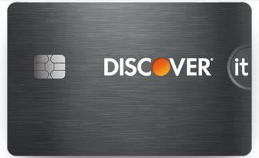
Discover is an established credit card company that has multiple different cards, the secured credit card they offer is the perfect option for someone who is just starting out and trying to get their first credit card.
We’ll go into this more later, but a secured credit card simply means you need to put cash down as collateral. For the Discover It Secured Credit Card you need to deposit at least $200 up front and that will be your credit limit.
This is a great way to get approved for a card. And honestly if you don’t have $200 to invest in building your credit then maybe you shouldn’t be taking out a credit card in the first place.
That being said getting this card and making payments on time could be the stepping stone to getting approved for better cards down the line, especially since Discover has better cards to offer once you have established credit and build up your score.
This is a terrific first time credit card option for beginners.
2. Petal 2 Credit Card
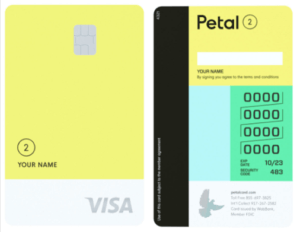
Honestly Petal 2 has some great features across the board. It has no annual fee, in fact, it has no fees whatsoever, no late fees, no foreign transaction fees-nothing. In addition to that the interest rate isn’t terrible (for a beginner card) as it fluctuates from 17.74% to 31.74%, and they will approve you for anything from $300-10,000.
It also offers cash back that ranges from 1-10% for select merchants. And it gives you perks for paying on time. While it starts at 1% cash back right away if you pay it on time for 6 months it goes to 1.25% and then if you pay it on time for a year they bump that up to 1.5% (The 10% is probably rare).
Now the key thing about this card is that you can be approved with no credit as they have a system will look at other factors like your income. Here is the thing though, as a beginner they may do 1 of 2 things if you’re approved-either they approve you for a low limit with the highest rate OR they might approve you for their Petal 1 Credit instead, which is their earlier version that doesn’t have quite as good of features.
Either way, as a beginner, this is a good option to look into.
3. Mission Lane Credit Card
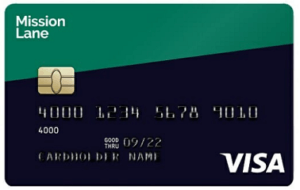
The Mission Lane Credit Card is a terrific option if you’re starting out as you can get approved with limited or a below average credit score. In addition to that you don’t need to make a deposit as it’s an unsecured credit card.
Now, this card doesn’t come with too many perks as it’s really designed as a beginner’s credit card. While you’ll likely only get approved for a few hundred dollars up front if you keep your account in good standing and make payments on time you can qualify for automatic credit line increases, which is an important part of helping your credit utilization ratio.
Best Credit Cards for College Students
College can be expensive, especially if you are away from home for the first time. A credit card can come in handy, but it can also be difficult to get because of your student status. However, some credit providers offer student credit cards that are tailored to the requirements of college students.
In other words, being a student gives you an advantage starting out trying to get approved for a credit card.
You also have the option of getting a secured credit card, if you have enough cash for a deposit. This is a great route to explore if you want to build credit without accruing too much debt.
It can also be a clever way to build credit using money that your parents may have loaned you for college. You can use the money to get a secured credit card, build your credit score, and then return the money when you are in a position to open an unsecured credit card.
Here are some great options for credit cards for college students:
1. Discover It Student Cash Back
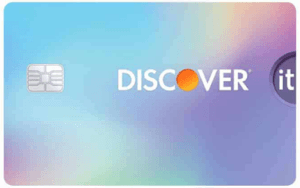
This credit card is designed specifically for college students who want to build credit. They offer incredible awards from popular outlets. In addition, it has no annual fee and a 0% intro APR for six months.
This makes it a great option for students who need to make big purchases in the first six months of college as they can make the best of the intro APR.
This credit card also offers excellent cash-back rewards and will match your cash-back amount in your first year. Thus, if you get $100 in cash-back rewards, they will give you another $100!
2. Bank of America Travel Rewards Credit Card for Students
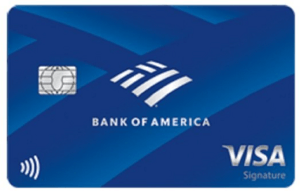
This is an excellent credit card for college students that want to travel back and forth between home and college.
Whether they are in a different state or a different country, this card can be beneficial. It allows students to collect reward points that they can redeem as travel perks.
The card also has no foreign transaction fees and no annual fees. There is also a 0% intro APR which also comes in handy should students have to make large purchases or pay for the cost associated with moving to college.
3. Captial One SavorOne Student Cash Rewards Credit Card
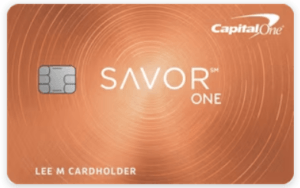
This credit card has pretty impressive rewards for students. Firstly, it doesn’t have an annual fee or any penalty APRs associated with it. Secondly, students can earn 3% back from grocery store purchases, streaming services, dining, and entertainment.
Students can also earn a $50 bonus if they spend more than $100 in the first three months. This card also offers a $0 fraud liability cover which means that you will not be held liable if there are any unauthorized purchases on your card.
All three of these cards are great choices for college students. The APRs can be high, but that is expected for first credit cards and people with no credit history. The good news is that you can make use of the intro APRs for your college purposes and aim to pay them back before the high APR kicks in.
Why You Need to Build Credit
You might be wondering why a credit card is necessary, but it can be a great start in building your credit history. A good credit history comes in handy when you are ready to rent an apartment, buy a car, or get a loan. Loans can be valuable not just to buy things you want but can be potential business starters as well.
Financial institutions will judge your credit history and determine how high or low risk you are. Low credit scores will indicate that you are high-risk and this will impact what they are willing to offer you in terms of credit amounts and interest rates.
Thus, the better your credit history, the better rates and higher credit limits you will qualify for. So, getting a credit card now can be helping your future.
And over the long haul this can likely save you tens of thousands, if not hundreds of thousands or even millions of dollars.
Getting a credit card can be the initial building blocks of a good credit score.
Furthermore, if you sign up for a credit card, you can also enjoy several rewards and discounts that may come in handy as a student or someone new to “adulting”. Granted, you could be a senior citizen who has never used credit and wants to start now. It’s all the same.
Learning how to responsibly handle credit is also a great life lesson. Financially speaking, many of us will have to handle credit at some point in our lives. In fact, it’s almost nearly impossible not to have debt in today’s world. It could be paying a home loan, or when we buy a car — not many people buy things in cash anymore.
And in reality, if you’re responsible with debt, you can leverage debt to make money in business, so this is vitally important not to just avoid paying less in interest, but to be able to get approved for a variety of factors.
Thus, learning to be comfortable with credit, paying your installments on time, and learning how to use it to your advantage are all lessons to be learned. The earlier you start them, the better.
Secured vs Unsecured Credit Cards
We spoke about this above so it’s important you know the difference, when you start looking for a credit card, you will come across the terms “secured” and “unsecured” credit cards as your two options. They differ in how the credit limit on your card is established.
Secured credit cards are usually the card of choice for beginners or those trying to rebuild their credit scores. The money available on your credit card is what you have deposited as collateral into your credit account.
If you use your credit card and fail to make a repayment, the credit provider will keep your cash deposit. However, if you make your payments on time, you can quickly and efficiently build credit.
In addition, you can usually eventually get your deposit back if you make your payments on time. This makes it a great way to build credit without the fear of going into debt.
An unsecured credit card on the other hand, does not require collateral of any form. The credit limit you receive will be based on your current credit score.
Usually, the lower your credit score, the higher the interest rate on the credit card. Thus, the longer you take to pay off your credit card, the more you will end up paying.
Unsecured credit cards are better for individuals who are used to handling credit and who have a better credit history. You just have to ensure that your credit limits are within your means to repay and that you don’t spend irresponsibly because you have a higher credit limit.
Tips for Choosing a Credit Card
If you’re choosing a credit card for the first time, there are a few things in particular that you should look out for. Let’s take a closer look.
Eligibility
If it is your first credit card, you will need to fulfill certain criteria to qualify. For college students, some credit card providers may need proof of college registration, and may even ask a parent to co-sign for you depending on your age.
The less credit you have the more information they may require up front, and even potentially income information may need to be provided.
Ideally you don’t want to have to waste and inquiry and get denied for a card, that’s why it’s important to apply for cards you’re likely to get approved for, hence this article.
Annual Percentage Rate
The annual percentage rate or APR refers to the interest rate associated with your credit card. It is essentially the cost of borrowing as it is the extra amount that you have to pay back when you use your credit card.
Fees
Credit cards will have fees associated with them and you should always read the fine print to ensure that you are aware of all of the fees. There is often times an annual fee that you will have to pay every year that your account is active.
Then there are sometimes fees associated with every time you use your card, and there can also be penalties in place for late repayments or failure to pay. These will all contribute to the affordability of the card.
Just make sure you read your terms beforehand.
Minimum Repayments
This is the minimum payment that you will have to make every month depending on your usage. As much as it is your first time getting a credit card, it is always best to estimate how much you can realistically afford in terms of repayments before you decide on a card. This will set up your budget upfront instead of battling later on.
Credit Limits
As long as you’re responsible with using credit cards then the higher limit the better because it gives you more spending power and if you do use your cards it won’t affect your utilization as much. That being said, if you’re someone who is just bad with spending money, then this could probably overlooked, especially if you’re just looking to get your first credit card.
Look for Rewards
Some credit cards offer loyalty points, rewards, and even cash-back discounts. These can come in handy depending on the purchases you are making and how much you can save on them. This can be a huge advantage of getting a credit card if you know how to make the best of these rewards.
You must keep in mind though, your first credit card is not going to have the best rewards or credit limits. Try to find the right balance of what will work for you currently. Once your credit score improves, you can always get a better credit card with better perks.
Conclusion
Getting a credit card is now easier than ever with our financial system that tends to place people in more and more debt. There are now a wide variety of options. As a beginner to credit cards, you must choose wisely to be able to build your credit score responsibly.
Secured credit cards may be a better option because you’re more likely to get approved up front. In addition to that, when you actually use your hard earned money to buy into something, you’re more likely to take it serious. In other words, you’re more likely to make payments responsibly.
And that’s the key with all of this, taking out credit cards is great to build your credit, you just need to make sure you have a budget and spend money wisely.
Hopefully this article has given you some valuable information needed to choose a credit card that will work if you’re a beginner or college student. It is up to you to decide which option is best for you.
Are there any other options you would have included in this list? Let me know in the comments below!